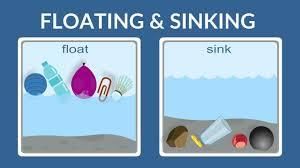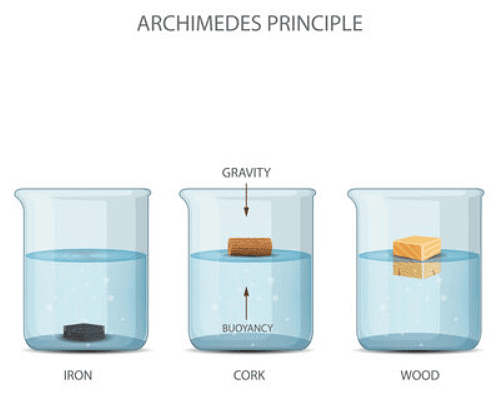Class 9 Exam > Class 9 Notes > Year 9 Physics (Cambridge) > Forces
Forces | Year 9 Physics (Cambridge) - Class 9 PDF Download
Introduction to Floating and Sinking
- Objects float or sink depending on their density compared to the density of the liquid they are placed in.
- Density is the mass of an object per unit volume.
- If an object is less dense than the liquid, it floats; if it is denser, it sinks.

Factors Affecting Floating and Sinking
- Density: Determines whether an object will float or sink.
- Example: A wooden boat floats because wood is less dense than water.
- Volume and Shape: Volume affects buoyancy. Changing the shape can affect how an object interacts with water.
- Example: A ball of clay may sink, but a flat piece of clay can float if shaped to displace enough water.
Archimedes' Principle
- Explains buoyancy force exerted on objects immersed in fluid.
- Buoyant Force: Upward force exerted by a fluid that opposes the weight of an immersed object.
- Example: Ships and submarines are designed with buoyant forces to stay afloat or submerged.

Applications in Everyday Life
- Boats and Ships: Designed to displace enough water to stay afloat.
- Example: Cruise ships are engineered to float even with heavy loads of passengers and cargo.
- Hot Air Balloons: Use buoyancy to rise and descend by heating air inside the balloon.
- Example: As air inside the balloon is heated, it becomes less dense than the surrounding air, causing the balloon to rise.
Question for ForcesTry yourself: What determines whether an object will float or sink in a liquid?View Solution
Conclusion
- Understanding floating and sinking helps in designing objects that interact effectively with fluids.
- Concepts like buoyancy are crucial in engineering and everyday applications involving liquids.
The document Forces | Year 9 Physics (Cambridge) - Class 9 is a part of the Class 9 Course Year 9 Physics (Cambridge).
All you need of Class 9 at this link: Class 9
|
9 videos|20 docs|4 tests
|
FAQs on Forces - Year 9 Physics (Cambridge) - Class 9
| 1. What is the concept of floating and sinking? |  |
Ans. Floating and sinking is the behavior of objects in a fluid where objects that are less dense than the fluid will float, while objects that are more dense than the fluid will sink.
| 2. What factors determine whether an object will float or sink? |  |
Ans. The factors that determine whether an object will float or sink include the density of the object compared to the density of the fluid, the shape and size of the object, and the overall buoyant force acting on the object.
| 3. How does the force of gravity play a role in objects floating or sinking? |  |
Ans. The force of gravity pulls objects down towards the Earth, causing them to sink in a fluid if they are more dense than the fluid. Objects that are less dense than the fluid will experience an upward buoyant force that counteracts gravity, allowing them to float.
| 4. Can an object be made to sink if it initially floats on a fluid? |  |
Ans. Yes, an object that initially floats on a fluid can be made to sink by adding weight to the object, increasing its density, or changing its shape to disrupt the balance between the buoyant force and the force of gravity.
| 5. How do submarines and ships utilize the concepts of floating and sinking in their operations? |  |
Ans. Submarines and ships utilize the concepts of floating and sinking by controlling their buoyancy through the use of ballast tanks. By adjusting the amount of water in the ballast tanks, submarines and ships can either float on the surface or submerge underwater.
Related Searches
















